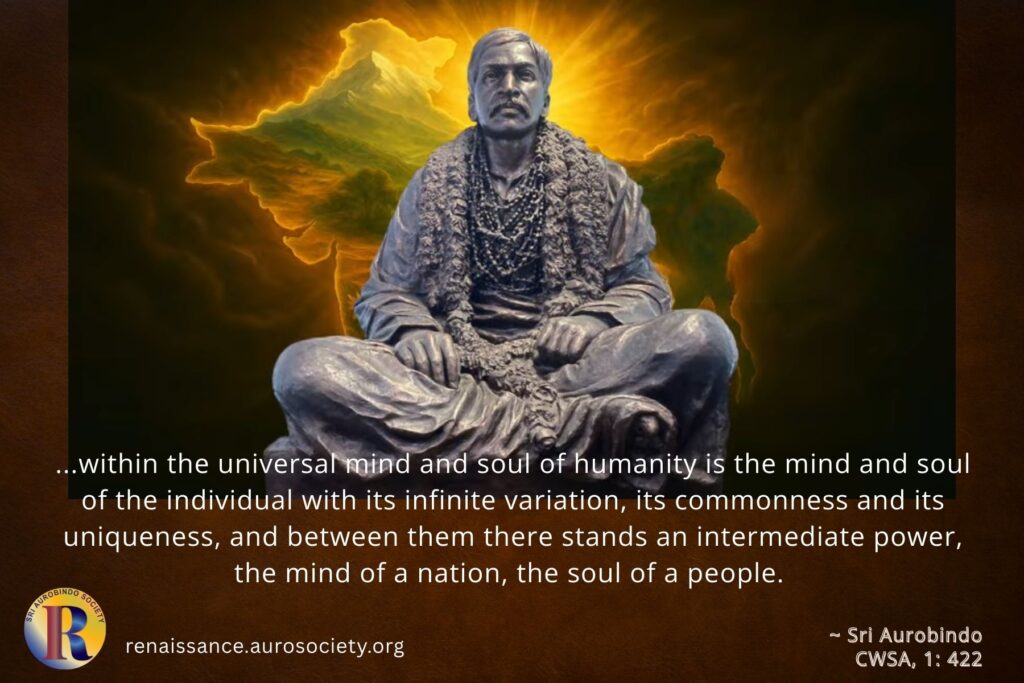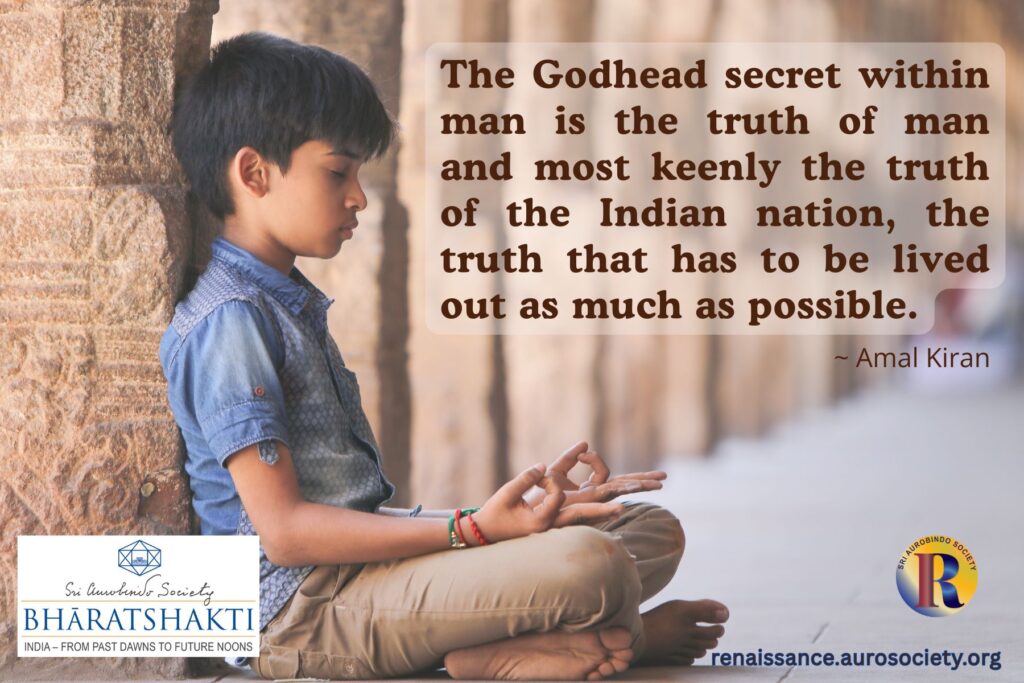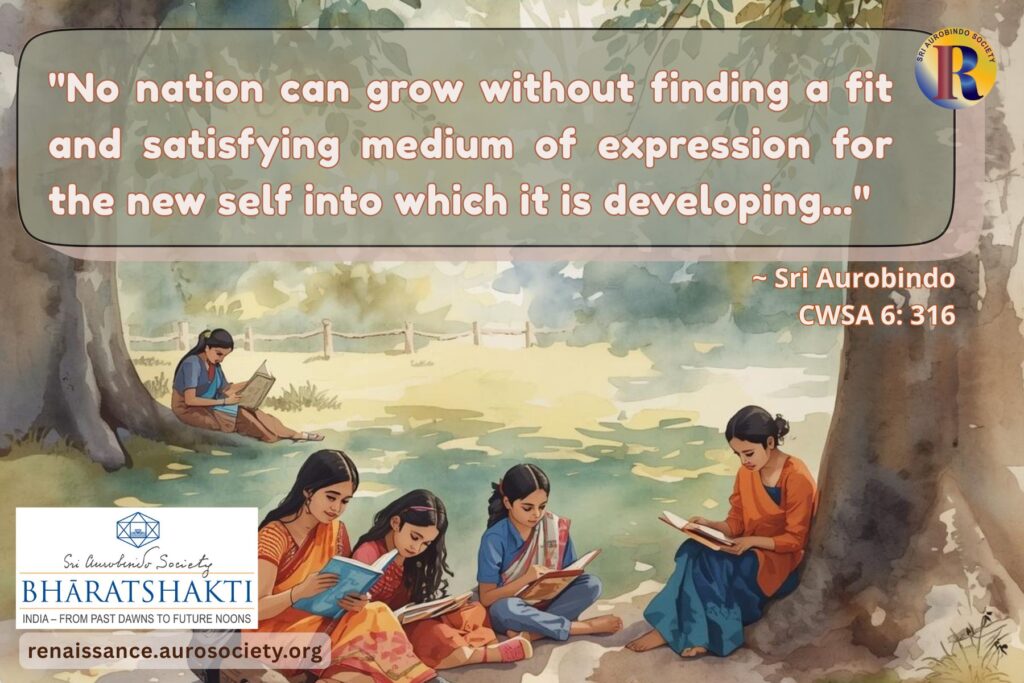CONTINUED FROM PART 1

Lights from On Original Thinking
In this majestic and sublime writing, written in Pondicherry around 1912 or 1913, Sri Aurobindo begins with his introspection of India’s stagnancy. He discusses the attitudes of the society toward original thinking, new light and new thought. Talking about the widespread inertia of Indian society, he states boldly that “few societies have been so tamasic, so full of inertia…few have been so eager to preserve themselves in inertia” (CWSA, Vol. 12, p.38).
He adds that incapability for higher and original thinking and bondage to the past has blocked the growth of India. It has crippled the nation in the face of continuous outer challenges and impressions.
The result of this well meaning bondage has been an increasing impoverishment of the Indian mind, once the most gigantic and original in the world. Hence a certain incapacity, atrophy, impotence have marked our later activities even at their best.
The most striking instance is our continued helplessness in the face of the new conditions and new knowledge imposed on us by recent European contact.
~ CWSA, Vol. 12, pp. 38-39
Infallible cure of a disease begins only with perfect and absolute tracing of its symptoms.
Sri Aurobindo writes that for many centuries Indian mind has been in chains of the authority of the śāstra, of religious code, of tradition and temper. It has forgotten its free existence and the ability to distinguish and differ, to sublimate and sophisticate. Our life is codified at every step and there is very little freedom to traverse on unknown territories.
Though there are majestic heights of wisdom and wit in these different authorities yet they have crippled the mind of the succeeding generations and left them intellectually barren and creatively defunct. The individuals have lost their innate power of vision and expression, of creation of interpretation.
Sri Aurobindo wants young free thinkers to rebel against the docile servitude of all authorities and walk on the new path, using the authorities as ballast.
Unfortunately, some individuals who rebelled against the authority of scripture and tradition blindly accepted the Gospels of the west as mantras for all maladies. This is an error and thrice an error! Calling this attitude a “foolish exchange of servitude”, Sri Aurobindo categorically writes that we must be free ‘in the name of Truth, not in the name of Europe”.
By reversing, for a time at least, the process by which we have lost it, by liberating our minds in all subjects from the thraldom to authority. This is not what reformers and the Anglicised require of us. They ask us, indeed, to abandon authority, to revolt against custom and superstition, to have free and enlightened minds.
But they mean by these sounding recommendations that we should renounce the authority of Sayana for the authority of Max Muller, the Monism of Shankara for the Monism of Haeckel, the written Shastra for the unwritten law of European social opinion, the dogmatism of Brahmin Pandits for the dogmatism of European scientists, thinkers and scholars. Such a foolish exchange of servitude can receive the assent of no self-respecting mind.
Let us break our chains, venerable as they are, but let it be in order to be free–in the name of truth, not in the name of Europe.
~ CWSA, Vol. 12, p. 40

What Sri Aurobindo feared most has happened on a mass scale in post independent India.
Today there are two classes of people in India: the first one is the culture enthusiast, the meek lover of tradition and scripture, the devout disciple of authority. Second class is that of an educated but extremely Anglicized class of society that cherishes and idolizes everything European and English.
This second class is deep in the incantation of Marx and Machine, artificial intelligence and intellectual artilleries of the west. They harbour myopic view towards India, Indian culture and wisdom tradition to the extent of pathological hatred.
To Sri Aurobindo, this attitude toward one’s own culture and roots is suicidal. He doesn’t want freethinkers of this brand. Nor does he support myopic culture chauvinists. His vision of original thinking is amazingly new and radically different from others.
How Should India Think and What Should India Think
Thinking defines a nation, a people, a civilization and civilizational ethos.
Today India feels immensely proud of her past due to the legacy of light left by her forefathers. But the long night of servitude and depression, of dolour and cultural devastation has left India weak and obsequious. Now that the night is over, new and brighter possibilities of manifold development are looming large on her horizon.
This passing moment is the moment of India, she must seize it, sublimate it and make it a sublime music of her soul. India, the country of meditation, should delve deep and think.
Sri Aurobindo understands the power of thought and new light. He writes that thinking is the first necessity of new and free India. Meaningful and mighty thinking in all walks of life shall weave the texture of her fate. The following lines must be the guiding light for the builders and lovers of new India:
Our first necessity, if India is to survive and do her appointed work in the world, is that the youth of India should learn to think,—to think on all subjects, to think independently, fruitfully, going to the heart of things, not stopped by their surface, free of prejudgments, shearing sophism and prejudice asunder as with a sharp sword, smiting down obscurantism of all kinds as with the mace of Bhima.
~ CWSA, Vol. 12, p. 40
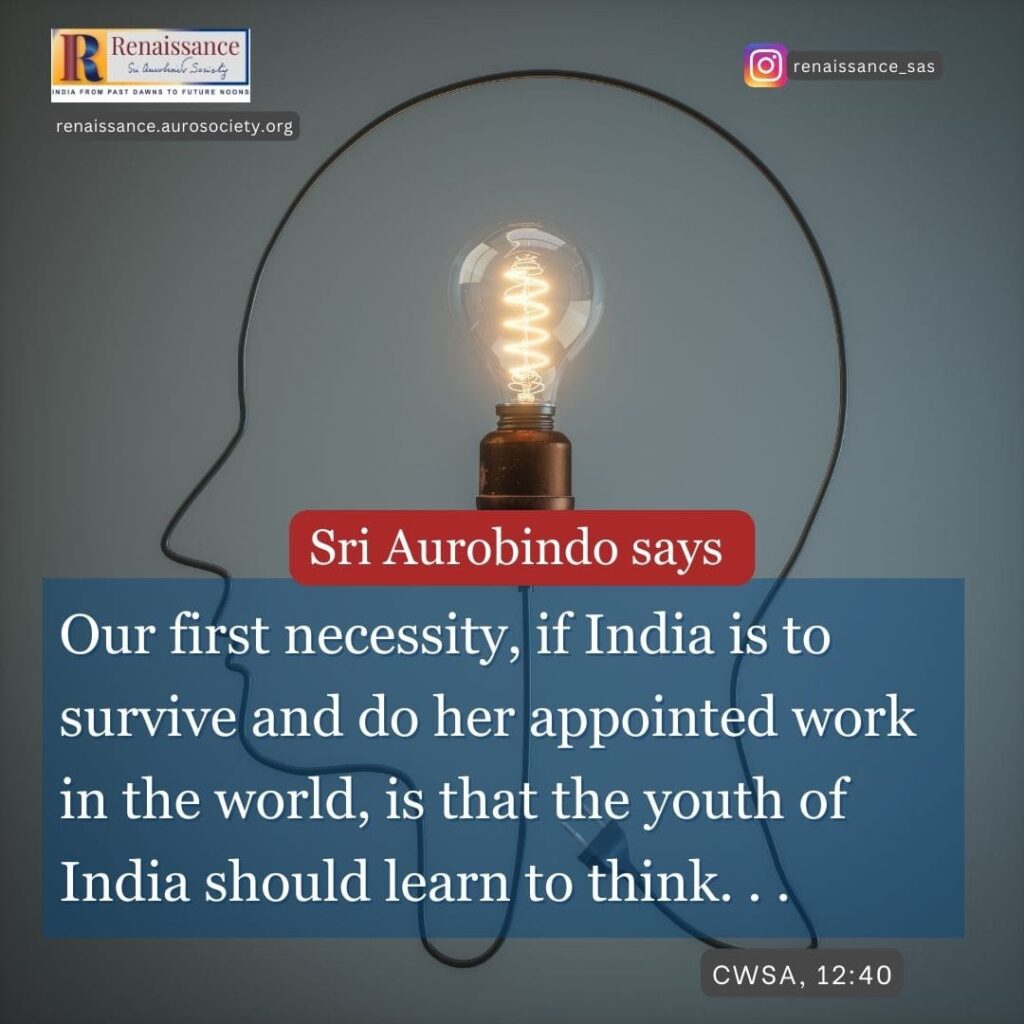
The youth of contemporary India should hear and assimilate these words of the Mahayogi very seriously as they are at the forefront of the changing faces and dynamics of time. They are the one who have to shoulder the responsibility of leading the nation ahead mid tornadoes and tsunamis galore. They have to think and think widely. Imperfect thinkers shall never build a perfect nation.
The quote summarizes the spirit of the whole essay. Sri Aurobindo emphasizes that India should think, should she wish of her long lasting survival! Thinking is living. Thinking paves the path to national longevity. Independent, fruitful, successful, deep thinking are the key to national growth and material survival.
But freethinkers of new India should remember that there should be no ideological bias, no myopia, no cherry picking, no tinge of prejudgment, no trace of sophism and no obscurantism in their thinking. Truth should be the only touchstone, truth the crucible and truth the sole aspiration of their thinking.
Accept Nothing, Question Everything
The aforesaid advice is the mantra for the thinkers of new India. Nothing unexamined should be accepted as a holy gospel. Everything should be doubted and debated, everything should be critiqued and questioned. This is the demand of scientific inquiry. The thinker shall go down to the heart of things only if he/she doubts everything, free from prejudgment and prejudice, perception and presumption.
The children of independent India should think for the manifold greatness and opulence of their motherland. They should understand and assimilate India, they should worship and work for India, they should create and cultivate for India.
Europe, America or any other foreign eye shall never adore and appreciate, assimilate and associate itself with India as the Indian heart would. If India grants that largesse to a foreign hand , she should be but “an ill-exucuted and foolish copy of Europe” ! The development of India and Indians should be on the swabhaav and swadharma of India. Sri Aurobindo says,
We must begin by accepting nothing, on trust from any source whatsoever, by questioning everything and forming our own conclusions… India can never cease to be India or Hinduism to be Hinduism, if we really think for ourselves. It is only if we allow Europe to think for us that India is in danger of becoming an ill- executed and foolish copy of Europe…
Our first business as original thinkers will be to accept nothing and question everything.
~ CWSA, Vol. 12, p. 41
Our thinking should be large, luminous, syncretic and all encompassing in its nature. It should be mellow and meaningful, original and inclusive to the contemporary spirit and suitable for the zeitgeist.
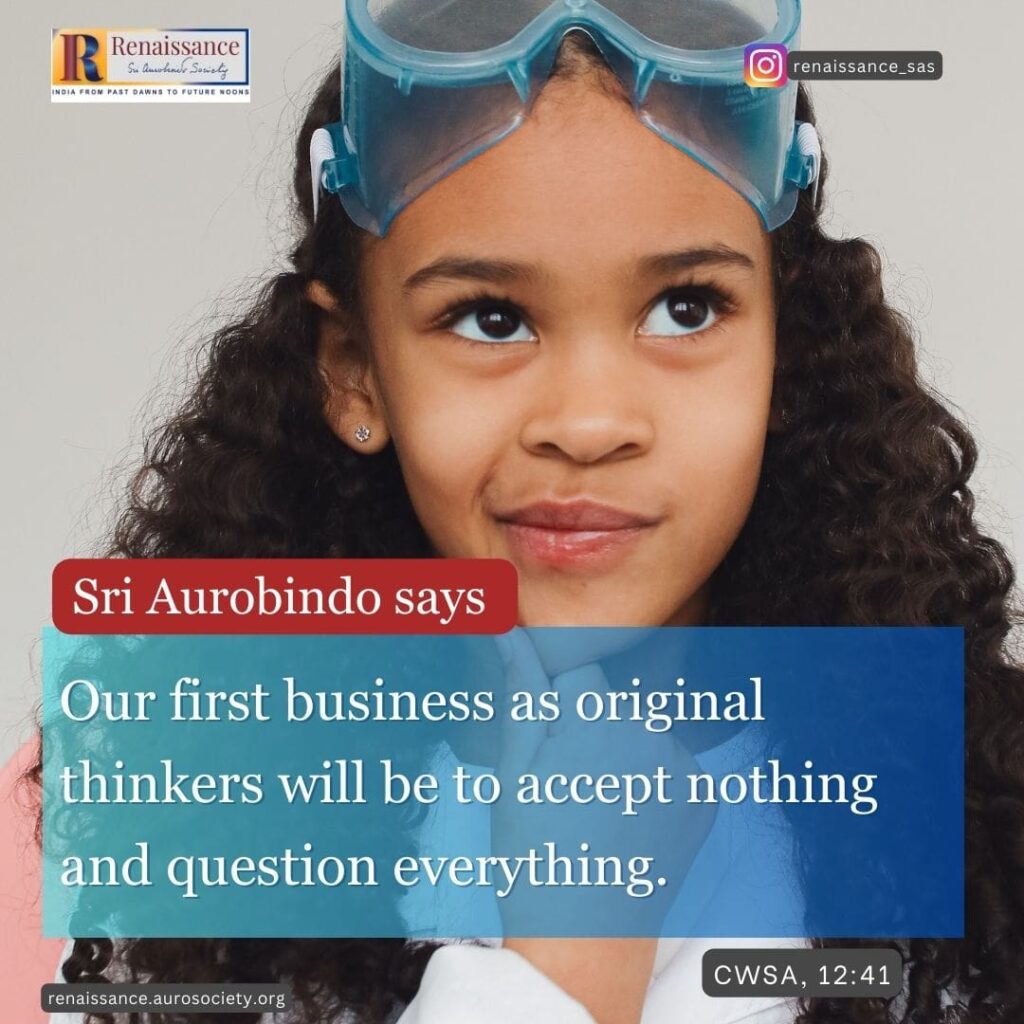
At the end of his essay Sri Aurobindo comes with an advice for the free thinkers. Any new thought, new viewpoint, new wisdom and new perspective of looking at the world or the scripture or the social and culture structure of the society or the traditional line of thinking should be wide and all-embracing and magnanimous enough to replace or adjust with the previous one.
A weak and meek idea shall not withstand the critical wrath of existing edifices and easily crumble in the touchstone of Time. The fire and force, resilience and rigour of the new idea /thinking should be resistant enough to take old ideas and systems, patterns and viewpoints. The thinker should be the first critic of his own thought. Sri Aurobindo writes:
This world, this society, these nations and their civilisations are not simple existences , but complex and intricate, the result of a great organic growth in many centuries, sometimes in many millenniums. We should not deal with them after snatching a few hurried generalizations or in the gust and fury of a stiff fanaticism.
We must first be sure that our new thought is wide and strong-winged enough, our thoughts large enough, our nature mighty enough to deal with those vatsnessess.
~ CWSA, Vol. 12, p. 43
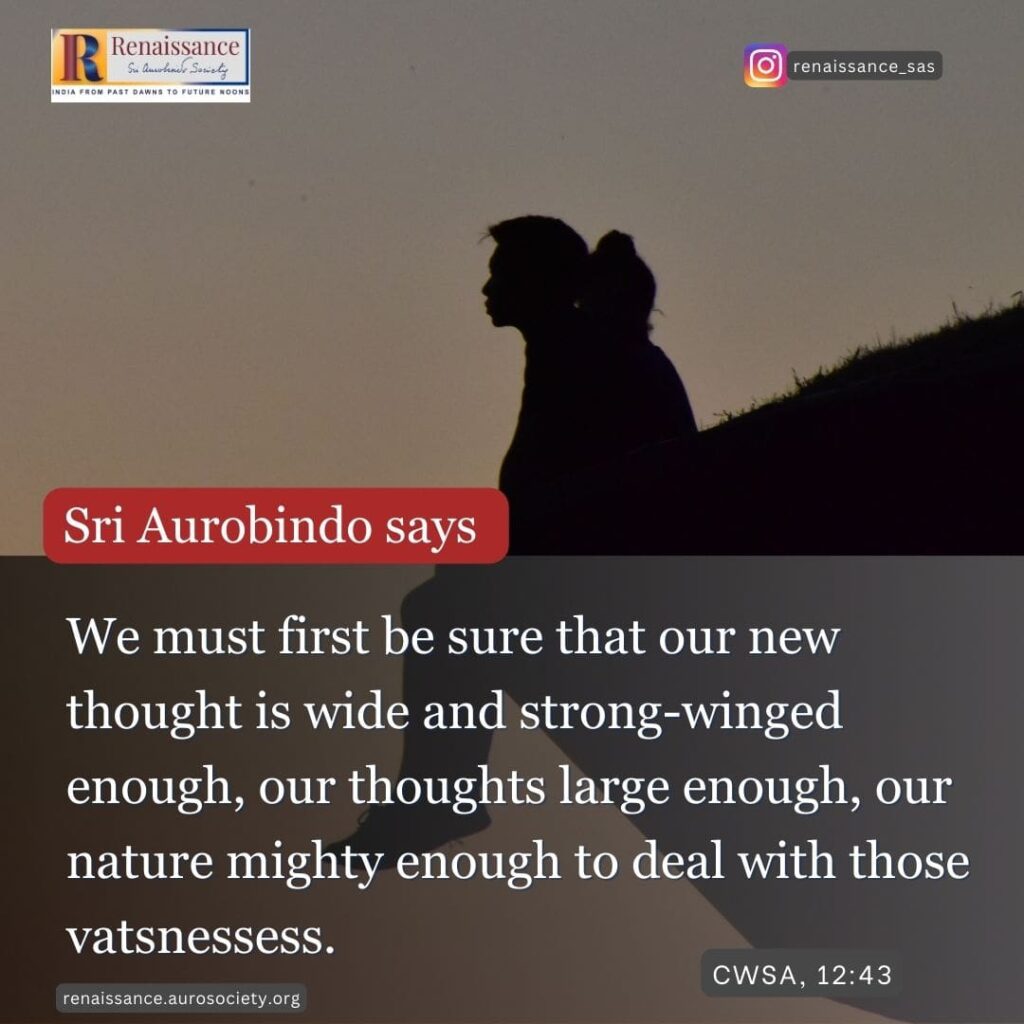
Sri Aurobindo’s essay On Original Thinking is full of new lights and wisdom for thinkers and philosophers of new India. It is one of the crest jewels in the vast oeuvre of Sri Aurobindo. It holds great light and delight for lovers, dreamers, thinkers, builders and makers of new India.
India should savour and celebrate the spiritual illumination of this unique blessings of Sri Aurobindo.
READ PART 1
~ Design: Beloo Mehra

